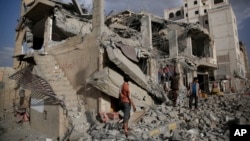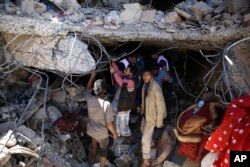The United Nations is preparing to ask international donors for $1.8 billion to pay for humanitarian aid to millions of people in Yemen this year.
U.N. humanitarian chief Stephen O'Brien told the Security Council the appeal will be launched on Thursday. He laid out the effects of the devastation Yemen has experienced in the past 12 months, and said the money would pay for food, water, sanitation and urgent healthcare for up to 10.6 million people.
A conflict between Houthi rebels and the government of President Abd Rabbu Mansour Hadi intensified in March 2015 when the Houthis, who already controlled the Yemeni capital, pushed south to the port city of Aden and sent the president fleeing to Saudi Arabia.
The Saudis came to Hadi's aid by leading a coalition conducting airstrikes against the Houthis.
O'Brien said Tuesday the fighting has killed more than 6,000 people, half of them civilians, while forcing 2.7 million people to flee their homes.
Hundreds of health facilities have been closed because of damage or lack of staff, and millions of children are no longer attending school. O'Brien highlighted difficulties in getting aid to areas controlled by the Houthis, the government and militants, reiterating their responsibility to facilitate humanitarian access.
"I cannot overstate the importance of donor support for this endeavor, nor the urgency we face in responding to humanitarian needs that only deepened as the conflict intensifies," he said.
The U.N.'s Humanitarian Response Plans usually fall far short of their fundraising goals. Last year, the HRP for Yemen came with a request for $1.6 billion dollars, while donors contributed just over half that amount at $893 million.
Two other U.N. officials expressed special concern Tuesday about the situation facing civilians in Yemen.
Adama Dieng, the U.N.'s Special Adviser on the Prevention of Genocide, and Jennifer Welsh, the Special Adviser on the Responsibility to Protect, said all parties in Yemen's conflict continue to target civilians, and that there is extensive evidence of violations that may amount to war crimes.
"One year after the escalation of the conflict in Yemen, the world is witnessing the erosion of respect for international humanitarian and human rights law on a daily basis," they said in a joint statement.
They called for investigations into alleged violations with the support of the global community, with the possible establishment of an international mechanism for accountability in Yemen. Dieng and Welsh also warned that the violence in Yemen could have dire impacts on the rest of the Middle East.
"The international community cannot afford to underestimate the risk of a spillover of a conflict that is fueling religious and sectarian divide. We must, collectively, make the protection of the civilian populations of Yemen our primary consideration if we are to avoid a catastrophe in this region,” said the statement.






